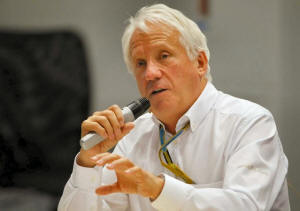|
The halo, a titanium structure fixed at three
points with a central upright in front of the driver's vision
and an overhead loop, has been introduced to protect against the
risk of bouncing wheels and other debris.
Some drivers have expressed concern about seeing the start
lights, depending on where they line up on the grid.
"With the halo, what we've asked every circuit to do is to make
the lights at a standard height above the track," the governing
FIA's race director Charlie Whiting told reporters on Thursday.
"We've also put a repeat set of lights, in this case off to the
left, over the verge."
The repeat set were introduced around 2009 when higher rear
wings made it harder to see the lights, but aerodynamic changes
have now fixed that problem.
"Now the wings have been lowered, there's no need for those
(lights) halfway up the grid so I've decided to utilize them
somewhere else," said Whiting.
"Pole position seems to be the worst case scenario with the halo
there -- maybe the driver can't quite see the lights, or see
only half of them, and he might have to move his head too much."
The new arrangements will be tried out on Friday after the two
practice sessions at Albert Park, with drivers allowed to
rehearse starts on the grid.
Whiting also played down fears that the halo would make it
harder for fans to see drivers' helmets as a means of
identifying who was at the wheel.
Haas's Danish driver Kevin Magnussen has said he feared fans
were "not going to have a clue who is who".
Whiting said driver numbers had already become much more
prominent on cars last season.
(Reporting by Alan Baldwin in London, editing by Toby Davis)
[© 2018 Thomson Reuters. All rights
reserved.] Copyright 2018 Reuters. All rights reserved. This material may not be published,
broadcast, rewritten or redistributed.
Thompson Reuters is solely responsible for this content.
 |
|






